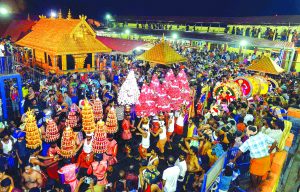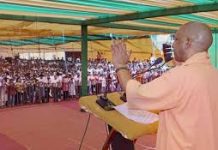 Thousands of devotees swarmed Sabarimala temple, located in Pathanamthitta district, Kerala, when it opened its gates for the annual Mandala-Makaravilakku festival on November 17. The festival will go on for two months. Heavy security has been deployed outside the temple in the backdrop of the ongoing controversy on whether the temple should break its ancient rituals to allow women inside its premises.
Thousands of devotees swarmed Sabarimala temple, located in Pathanamthitta district, Kerala, when it opened its gates for the annual Mandala-Makaravilakku festival on November 17. The festival will go on for two months. Heavy security has been deployed outside the temple in the backdrop of the ongoing controversy on whether the temple should break its ancient rituals to allow women inside its premises.
Nevertheless, women devotees were not sighted among the thousands who gathered for the congregation at the Lord Ayyappa temple amid vehement protests by women activists.
Unaware of the tradition that bars the entry of women inside Sabarimala, 10 women tried to visit the temple on November 16 but were sent back from Pamba after police warned them of the temple’s age-old rituals.
Tehelka spoke to multiple eminent devotees (mostly men) of Lord Ayyappa to find out why people are opposing to the entry of women in Sabarimala and on what grounds. Of course, the devotees defended the rituals of the temple baring women of certain age-group inside its premises. In fact, when interviewed, both men and women from Kerala, Tamil Nadu and Andhra Pradesh claimed that it is the wish of the presiding deity in the Sabarimala Temple to not have women in his vicinity because Lord Ayyappa left the worldly desires to observe celibacy for life. And the devotees are just keeping the wish of the deity alive.
There seems to be unanimous opinion amongst the devotees who state that the controversy has been blown out of proportion, and that the tradition had nothing to do with disempowering women.
“People who do not belong from South India are the one creating a controversy since they don’t understand the customs and history surrounding Sabarimala or southern region”, one devotee says, “Otherwise, women devotees too do not want the age-old tradition to be revoked at any cost.”
KV Madhusudhanan, former IGP from Kerala, a devotee of Lord Ayyappa, maintains that there are suitable places where we can promote women empowerment and gender equality. He said that all women in the society have been wholeheartedly supporting the tradition and welcoming it, and that it was unnecessary for outsiders to come and create a controversy.
“I want to ask all those people protesting if allowing women in the temple will help end the problems of gender disparity in our society? This place is unique and attracts millions of people because of these special traditions, tampering with the rules will discourage and dismay the devotees who have a reason to visit this place,” Madhusudhanan says.
On the protest led by some women on their ban inside the temple he says, “There are some people who want to be branded as rebels, they want to question everything in the society. We should let them do, as the democracy allows it. There are innumerable temples of Lord Ayyappa across the country, so protesting only here doesn’t really matter.”
He says altering the tradition will take away the essence of the place, and it will exude the same aura for the devotees. It will then be like just any other place, he adds.
Another Lord Ayyappa devotee from Kerala, Shivshankar, who is a financial manger, says he strongly opposes the Supreme Court verdict of September 2018 as the decision was purely based on gender equality, giving zero importance to faith and religious belief, which has been the tradition for centuries and should have been respected.
“The situation became more worse when the women who tried to enter were not even Lord Ayyappa devotees, and they were supported by the Left government. But this is not surprising, because it is this government which had filed a PIL (in 2008) supporting the entry of women without understanding the faith of the Kerala Hindus. It’s good now they have realised this and reverted their stand. In the parliament election, they faced a huge defeat. So clearly, fundamental rights, faith and politics should not be mixed, Shivshankar says.
“The Kerala women who are not the devotees are the ones trying to enter the temple and this is clearly evident from the protest we saw,” he adds.
Though women don’t visit the temple physically, but they have a bigger role to play in the rituals of the Mandala-Makaravilakku festival. “They also have a significant role, when the men in their family undergoes the Vretham and visits Sabarimala, the ladies pray in their homes, which actually is the tradition. But, this was brought up as a gender inequality issue, which is wrong. Secondly, Swami Ayyappa is a Naishitka Brahmachari (celibate). But some people had raise the topic of ‘impurity of women’ as the reason for the restrictions on the entry of women, which is just to create confusion or dilute the case,” Shivshankar says.
When this reporter asked him whether he would still continue to visit Sabarimala if women are allowed, Shivshankar says, “I am strong believer of Swami Ayyappa and has been visiting the temple for ages. If a woman who does not have faith (in Ayyappa) enters, it will not stop me or other devotees from visiting the temple.
“Also, uniqueness is soul of every temple. Lakhs of women come every year. There is only one limitation which is the age and that is due to the nature of the prathishta. This clearly not
inequality,” he adds.
Another devotee from North Kerala, AV Arun, who is a CEO at a software company in Bangalore, says even men have some restrictions on temple entrance. For example, if a man has had kids or his relative dies, he cannot go to Sabarimala. Every deity has a nature of his own, and accordingly the restrictions are set. Every belief comes from a word, called Sankalpa (imagination) in Sanskrit. It’s the Sankalpa about a deity that makes a deity, it’s not a piece of stone. That’s what makes every temple alive. “The Sankalpa about the Sabarimala is that the deity is a Naishtika Brahmachari. So, we are honouring that Sankalpa,” says Arun.
About the protest, he claims that the protestors being outsiders (not from South India), who have no knowledge of the traditions and the essence of the rituals in Sabarimala temple. “To give you the perspective, let’s say a corporate built a replica of Taj Mahal, will you be interested in visiting it? Likely not, because in your mind, Taj Mahal is not just a physical structure, but the aggregation of history, believes and experiences associated with. Similarly, if I change the core of Sabarimala, it won’t be the same temple anymore.”
What SC says?
The Supreme Court on November 20 directed the state government to draft a separate and new legislation for Sabarimala temple, for the administration and welfare of the pilgrims to the shrine located in Periyar Tiger Reserve in Kerala. The apex court gave a deadline of the third week of January 2020 to frame the new law.
In September last year, the Supreme Court had ruled in favour of the women devotees stating that disallowing entry to Sabarimala on the grounds of gender and biological differences tantamount to violation of the constitution. The Apex Court reiterated that the ban violated the right to equality under Article 14 and freedom of religion under Article 25.
Following the new review petitions filed in the Supreme Court, the five-judge bench headed by Chief Justice Ranjan Gogoi on November 14 had decided to refer the issue to a larger bench in a 3:2 verdict to re-examine religious issues. The bench will also reexamine those religious issues arising out of its 2018 verdict lifting the ban on women of menstruating age visiting Sabarimala.
It is not that women have never stepped into Sabarimala temple. In 1991, a petition by a devotee named Mahendran led to massive protest when he pointed out that the temple management had played favouritism by allowing some VVIP women into the sanctum. The Kerala High Court then ruled out that women of menstruating age between 10-50 will be forbidden from entering into Sabarimala temple.
The Left-run Pinarayi Vijayan government in Kerala has been blamed for vacillating between supporting and dithering on the demands of the devotees. To everyone’s surprise, Kerala Devaswom Minister Kadakampally Surendran said that Sabarimala is not a ground for activism and “the LDF government would not support those who make announcements about entering the hill shrine for the sake of publicity.”
Now, all eyes will be on the Kerala government since the ball is in their court to draft a new and separate legislation on Sabarimala temple, as directed by the top court. Also, let’s wait till January 2020 to see whether Supreme Court would go with the same precedent it had set with the Ayodhya judgment or will it go back to its earlier verdict of September 28, 2018, that the Sabarimala temple violates freedom of religion under Article 25.
THE CASE UPDATE
1991: A petition by devotee Mahendran pushed the Kerala High Court to put a ban on women from entering Sabarimala between the menstruating years of 10-50 age. Mahendran busted that the temple management transgressed the rules by allowing VVIP women into the shrine.
2006: Indian Young Lawyers Association challenged the decision of Kerala High Court in the top court by arguing that the ban violated the right to equality under Article 14 and freedom of religion under Article 25. The Supreme Court issued notice to the parties.
2008: The matter was referred to a three-judge Bench in Supreme Court.
2018: In a 4:1 majority, the Supreme Court on September 28 ruled out in favour of the women devotees stating that disallowing entry to Sabarimala on the grounds of gender and biological differences tantamount to violation of the constitution.
In October, the National Ayyappa Devotees (Women’s) Association filed a review petition against the judgement of the Supreme Court. Other parties like Nair Service Society and All Kerala Brahmins Association also filed review petitions individually.
2019: On November 14, The five-judge Bench headed by Chief Justice Ranjan Gogoi referred the issue to a larger bench in a 3:2 verdict to re-examine religious issues.











